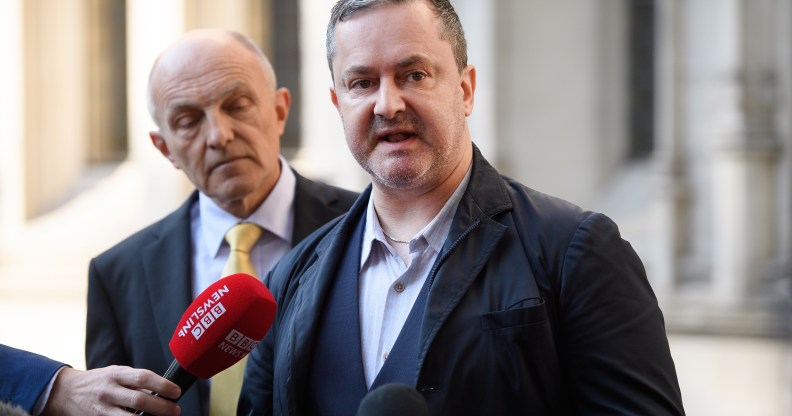European court throws out ‘gay cake’ case after activist’s seven-year legal fight

Gareth Lee outside the Supreme Court after the 2018 ruling. (Leon Neal/Getty)
The European Court of Human Rights has thrown out a high-profile “gay cake” case.
On Thursday morning (6 January), the Court in a majority decision rejected a claim brought by Gareth Lee, a gay activist who sued a Christian bakery for refusing to make a pro-marriage equality cake.
The ECHR declared the “gay cake” case, Lee v the UK, inadmissible on a legal technicality – a dispiriting end that leaves open larger questions of whether businesses can freely discriminate LGBT+ people.
It said it would not reconsider a 2018 decision made by the UK Supreme Court, which had overturned a £500 damages award dealt on Ashers Bakery.
In 2014, Lee had tried to order a cake from Ashers Bakery with a picture of Sesame Street‘s Bert and Ernie alongside the slogan: “Support Gay Marriage”.
It was planned for a queer activist event set to take place after the Northern Ireland Assembly had narrowly rejected legalising same-sex marriage for the third time. But the Belfast-based bakery denied the request, saying it clashed with the owner’s Evangelical Christian beliefs.
In 2015, both the Belfast county and the court of appeals ruled that the bakery had discriminated against Lee. The case was brought to the UK Supreme Court three years later, where the previous rulings were overturned.
The five justices of the Supreme Court found that the bakery did not refuse Lee’s order because of his sexuality.
Lee lodged a complaint against the UK government with the ECHR in 2019. However, the Court passed on Lee’s application because he had not invoked his human rights under the European Convention on Human Rights at any point while the case wound through the UK courts.
By relying on only Northern Ireland’s anti-discrimination law, the court said, he had not exhausted all the options available to him from the domestic courts.
The McArthurs, the bakery’s owners, had defended themselves on the basis of the European Convention on Human Rights, the Strausburg Court noted.

Daniel McArthur, managing director of Ashers Bakery and his wife Amy McArthur (Charles McQuillan/Getty)
It said: “The supreme court found on the facts of the case that the applicant was not treated differently on account of his real or perceived sexual orientation, but rather that the refusal to supply the cake was because of the defendants’ religious objection to gay marriage.
“What was principally at issue, therefore, was not the effect on the applicant’s private life or his freedom to hold or express his opinions or beliefs, but rather whether Ashers bakery was required to produce a cake expressing the applicant’s political support for gay marriage.”
The ECHR said it sought to balance the rights of the bakery owners with those of Lee as “a matter of great import and sensitivity to both LGBTIQ communities and to faith communities”.
“This is particularly so in Northern Ireland, where there is a large and strong faith community, where the LGBTIQ community has endured a history of considerable discrimination and intimidation, and where conflict between the rights of these two communities has long been a feature of public debate.”
‘Gay cake’ case could return to UK courts
Gareth Lee, a member of the advocacy group QueerSpace, said that the ECHR shrugging off the “core issues” has left him frustrated.
“None of us should be expected to have to figure out the beliefs of a company’s owners before going into their shop or paying for their services,” he said in a statement to the press.
“This case has put a spotlight on the challenges faced by LGBT+ in Northern Ireland. I will continue to support all law that protects and gives rights to all people equally.”
Ciaran Moynagh of Phoenix Law, who represented Lee, said they will now consider whether a fresh domestic case can be launched.
Activists sounded a similarly weary tone on the decision, expressing disappointment that the court passed on an opportunity to bolster LGBT+ rights.
Stonewall boss Nancy Kelley said of the ruling: “Today’s decision by the European Court of Human Rights is a backwards step for equality.
“Human rights belong to people, not businesses. No business should discriminate against their customers, and no discriminatory behaviour should be held up by equality law.
“Today’s decision leaves the door open for legal uncertainty across the UK and causes continued unease for our communities.”
John O’Doherty, who heads Northern Ireland’s top LGBT+ group the Rainbow Project, added: “This case was taken against the UK government for its failure to protect Mr Lee from discrimination.
“The subsequent decision of the UK Supreme court created legal uncertainty, not just in Northern Ireland but, across the UK.
“Unfortunately, with today’s decision, that uncertainty will remain.
“The Rainbow Project affirms our fundamental belief in freedom of religion for all people, however, this freedom cannot be extrapolated into privately owned business and used as a justification for discrimination.
“Fundamental human rights exist for people, not for for-profit businesses.”

